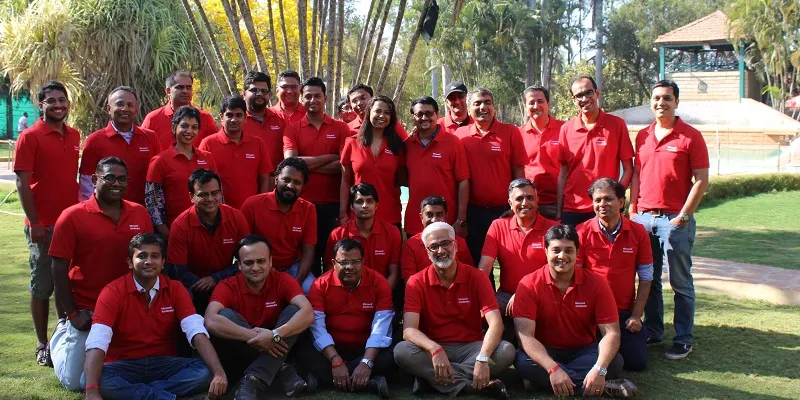Microsoft announces 10th accelerator programme with 14 later stage B2B companies
Fintech, AI and B2B seem to be the name of the game for 2017. Today, Microsoft announced its accelerator programme with 14 B2B startups. Apart from being in the B2B space, these 14 startups have another thing in common – they all have an artificial intelligence and machine learning startups or have some elements of the same as a core part of their product offerings.
Of these 14 startups, seven are series stage mature businesses, and at an average annual revenue rate (ARR) of $1.5 million and an average funding of $3.2 million. These include Sigtuple and Karomi, which have raised series stage funding in the last one month. The seed-stage companies, selected for deep-tech driven offerings, have an average ARR of $200k and an average funding of $1.5 million. They have been selected from the portfolios of Inventus Capital, IdeaSpring Capital, IDG Ventures, Pi Ventures and Accel Partners.
The late stage B2B focus
Bala Girisaballa, CEO in Residence, Microsoft Accelerator, says,
“Over the past few years, we have consciously moved towards choosing and selecting later stage startups as a part of the accelerator problem. The main idea is to see that the startups have proven market concepts and are scaling. Currently, the Indian startup ecosystem has also seen an increase in the number of later stage startups who need help from an accelerator. Today, in India there are several accelerators that help the early stage companies, but the go-to-market skills needed for scale is different. That is where Microsoft comes into play."
The 14 selected startups are Acebot, Active.ai, FirstHive, Heckyl, Karomi, Lavelle Networks, LetsTransport, QuestionPro, Sigtuple, Syscloud, Tricog, vPhrase, WittyParrot and Zenatix. The startups have been selected on the following parameters:
- The product base on how deep the technology
- The level of traction
- If the startups have been founded by successful professionals and serial entrepreneurs with domain knowledge and expertise.
The startups will be adopting Microsoft’s Azure Cloud, and make use of its advanced cloud services in areas like IoT, Big Data, Cognitive Services and Advanced analytics to scale their products. They will also work closely with Microsoft’s sales and marketing teams, and its partners in India and across the world.

A brief bio of the 14 startups are as follows:
- Acebot.ai – It is an enterprise chat bot solution that leverages conversational UI to enable collaboration, team productivity and data collation within any enterprise. Ravindra Krishnappa, CEO and Co-founder, Acebot.ai says that their partnership with Microsoft Accelerator is going to bring the best to the market and the customers.
- Lavelle Networks – The startup is building enterprise data networking platforms that enable high speed and safe consumption of cloud applications. Shyamal Kumar, CEO, Lavelle Networks believes that the Microsoft accelerator as a programme has given them a platform to reach a wider audience.
- Zenatix – Zenatix Solutions, an IoT-driven energy data analytics company. Rahul Bhalla, CEO, Zenatix believes that scaling up companies require more than revenue generation. It requires a thorough understanding of the global market. No one understands this better than Microsoft.
- Active.ai – A full stack enterprise AI platform for banks and financial services companies, enabling their customers to experience “conversational banking” over messaging, voice & IoT devices.
- Syscloud – Cloud security platform to detect and stop financial, customer, sales, IP data from insider theft, breaches and outside attacks.
- Heckyl – Big Data-based analytical platform for investors, traders and researchers of the financial industry which provides a real-time news and data analytics to brokerage firms, short-term traders, investors and fund managers.
- Witty Parrot – Intelligent micro-content / knowledge automation, collaboration & communication platform for sales, marketing, support and HR.
- FirstHive – The central marketing brain for a brand – creating unique marketing identities from the clutter of customer interactions across all marketing channels, driving customer conversations & marketing ROI.
- Sigtuple – Intelligent screening solutions powered by advancements in AI, image processing and cloud computing.
- vPhrase – Platform to make complex data reports more readable by summarising data and analysis in words using artificial intelligence.
- LetsTransport – Building enterprise data networking platforms that enable high speed and safe consumption of cloud applications.
- Tricog – The largest health AI startup leveraging the advances in technology to help save a million lives lost due to heart attacks.
- QuestionPro – Provides web-based survey software to analyse customer satisfaction, market research, employee satisfaction survey using tools that allow creation, distribution, and analysis of surveys, along with a platform for polling, tablet-based mobile research, and data visualisation.
- Karomi – Manages the compliance and speedy approval of aackaging artworks for pharma and FMCG companies so that they can get their products faster to the market,
The focus on B2B – the investor side
“While there are several B2B companies in India, building great products, one of my biggest pet peeves is the fact that Indian enterprises aren’t as open as the global counterparts to try out a new service or product,” says Samir Kumar, MD, Inventus Capital Partners.
While the partnerships between enterprises and startups are growing in India, like Samir believes, we still have a long way to go. Naganand Doraswamy, CEO, Founder and MD, IdeaSpring Capital also believes that it is a cultural issue, where Indian companies generally do not take risk.
As per the ‘Enterprise Readiness Report of Indian Startup Ecosystem, 2016’ there still exists a gap in the availability of enterprise-ready startup solutions for two primary reasons – the lack of mature solutions to address key enterprise business issues and the startups' ability to scale up to meet the demands of enterprise customers.







